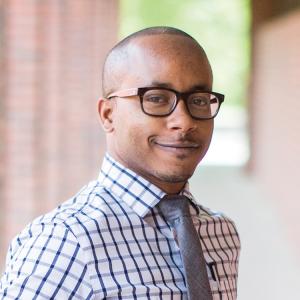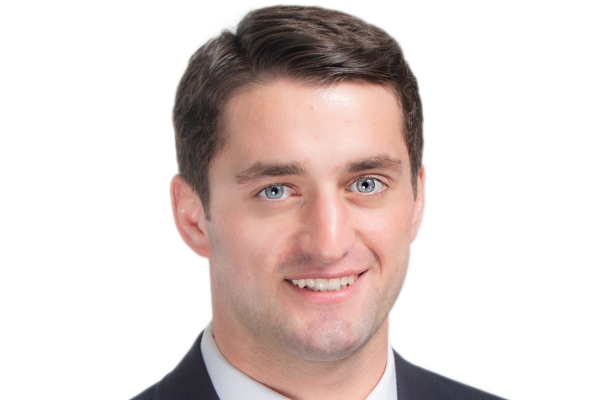
Panelists Share Application Tips, Industry Wisdom with MSDS Students

The Modeling Your Future Series for Residential M.S. in Data Science (MSDS) students continued on in the Spring 2025 semester, with the latest installment answering questions about the job application process. The Feb. 6 meeting featured a panel of data science recruiters and hiring managers that shared advice on resumes, automated recruitment software, career fair interactions, and follow-ups.
The series was created by the Office of Student Affairs Career Services Team as a supplement to the MSDS program, with the aim of helping students navigate the professional side of data science learning.
The panel included Melissa Phillips (MSDS '20), a software engineering manager at GA-CCRi; Kerry Walsh, human resources manager at 2nd Order Solutions; principal artificial intelligence consultant at Data Theoretic, Patrick Harrison; and Jillian Sinelli-Murphy, an early careers recruiter at Deutsche Bank.
Panelists shared how they source candidates and review resumes from applicants. But before delving further into the day's topics, the speakers and moderator Reggie Leonard, associate director for Career Connections and Community Engagement at the UVA School of Data Science, defined the differences between a recruiter and a hiring manager, since both were represented on the panel.
A recruiter, Harrison said, is someone who typically has no tech background and is tasked solely with finding qualified candidates, while a hiring manager is the person who is going to lead the candidate and usually has a data science background.
The panel was then asked about applicant tracking systems (ATS), which are commonly used today and involve automated filtering of online portal applicants based on keywords, school, or experience. Harrison noted that connections, networking, and referrals can often help with this part. “If you’re worried about the keyword sorting, you’re probably not in a good position,” he said.
HR manager Walsh said that at a smaller company like hers, automated filtering systems are not as commonly employed. But, as a result, internal referrals are given higher priority. The panel also agreed that, at their respective firms, every qualified application is read by a human.
The panel went on to discuss what students should focus on when curating their resumes. Beyond keywords, what do professionals look for in a resume that could lead to an interview? Software engineering manager Phillips, who often sits on hiring panels, said that a big priority is projects that demonstrate one’s technical ability. “We’re looking for meaty projects that showcase your skill set,” she said.
Walsh agreed that technical ability was important, but she also emphasized the relevance and diversity of an applicant's skill sets: “Our data scientists look for coding experience, even from a classroom with certain classes you have taken — things that are directly related to the role.” Walsh expanded upon this, stating that, despite having seen some very strong applications, the experience has to be related to the role. She said that, for example, vast health care data experience does not necessarily translate to every data science position.
Sinelli-Murphy gave insight on how an ATS is utilized at Deutsche Bank, as well as how students can use them to stand out. These systems can track logged attendance at career fairs and information sessions, tying them to a student's application and indicating commitment.
She stated that Deutsche Bank can sometimes get upwards of 10,000 applications for 20 roles, so standing out is essential. “The best way to get your application noticed is to attend information sessions or career fairs. They have QR codes and quick forms that will connect with your application and help you stand out,” Sinelli-Murphy said.
Walsh expanded on this advice, saying that at career fairs, doing a little homework on companies in attendance and asking relevant questions about their current projects will help students be memorable and demonstrate their interest. Additionally, Walsh said that if you have met a recruiter at a career fair or class, "sending a quick email after, appreciating the conversation and establishing interest, really does make a difference pre- or post-application.”
Harrison then shared the perspective of a hiring manager instead of a recruiter. “The key here is to do good, interesting data science work and share it in public,” he said. “This might look like giving talks, conferences, publishing dashboards or applications, creating blog posts about projects, developing a GitHub, or making contributions to open-source software. When you do this, get a link, URL, or QR code to put on your resume.”
Harrison and Phillips addressed how you are not always able to showcase your work directly, as there can be proprietary concerns or privacy issues that preclude you from sharing that information. Their advice was to spend a little bit of time to replicate the steps used to create datasets and apply them to other pieces of publicly available data, and then use the output from those models to curate your GitHub page.
The other panelists agreed that a clean and developed GitHub that demonstrates creative and technical work can do wonders on a resume. This can be one of the only ways that recruiters can see how data science education and experience translate into viable skill.
The panel then opened up questions to the student audience. One of the initial questions they received was about how applicants can approach the salary-range question. The panel generally said that they either do not ask for a salary range or they implement salary-band transparency, and that that they do not typically negotiate compensation for introductory-level professional roles.

When weighing two offers of differing pay levels, Harrison said to think more about the situation than just the numbers. “Trying to maximize earnings in your first job might not be the best strategy because the job itself, its upward mobility, and practical experience might prove to be more valuable. That would be your best strategy to make substantially more in the long run,” he said, concluding that the track matters more than the starting salary.
Students then asked about cover letters and getting no responses when sending out a flurry of applications. The panel frankly and unanimously concluded that cover letters very rarely get read, and their usefulness — unless required in the application — would be reserved for specific situations that cannot be covered in a traditional resume.
On the issue of getting "ghosted” by employers after applications or even interviews, the panel had multiple pieces of advice ranging from applying early, curating applications, to avoiding attachment to a particular job. Above all, they had great sympathy for recent grads in the current fickle job market. Sinelli-Murphy concluded: “Unfortunately, you've just got to keep at it. Apply early and often.”



